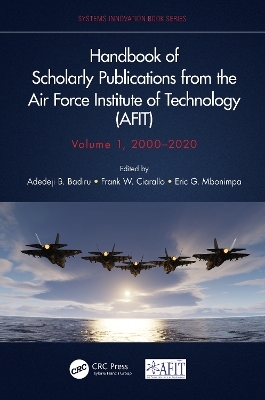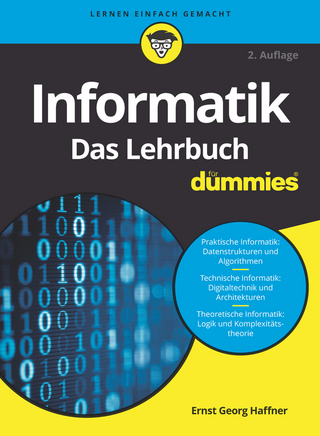
Handbook of Scholarly Publications from the Air Force Institute of Technology (AFIT), Volume 1, 2000-2020
CRC Press (Verlag)
978-1-032-11667-9 (ISBN)
In its over 100 years of existence, AFIT has produced the best technical minds for national defense and has contributed to the advancement of science and technology through technology transfer throughout the nation. This handbook fills the need to share the outputs of AFIT that can guide further advancement of technical areas that include cutting-edge technologies such as blockchain, machine learning, additive manufacturing, 5G technology, navigational tools, advanced materials, energy efficiency, predictive maintenance, the internet of things, data analytics, systems of systems, modeling & simulation, aerospace product development, virtual reality, resource optimization, and operations management. There is a limitless vector to how AFIT’s technical contributions can impact the society.
Handbook of Scholarly Publications from the Air Force Institute of Technology (AFIT), Volume 1, 2000-2020, is a great reference for students, teachers, researchers, consultants, and practitioners in broad spheres of engineering, business, industry, academia, the military, and government.
Adedeji Badiru is the Dean and senior academic officer for the Graduate School of Engineering and Management at the Air Force Institute of Technology (AFIT). He was previously Professor and Head of Systems Engineering and Management at AFIT, Professor and Department Head of Industrial and Information Engineering at the University of Tennessee in Knoxville, and Professor of Industrial Engineering and Dean of the University College at the University of Oklahoma, Norman. He is a registered Professional Engineer (PE), a certified Project Management Professional (PMP), a Fellow of the Institute of Industrial Engineers, and a Fellow of the Nigerian Academy of Engineering. He holds a BS in Industrial Engineering, a MS in Mathematics, a MS in Industrial Engineering from Tennessee Technological University, and a Ph.D. in Industrial Engineering from the University of Central Florida. His areas of interest include mathematical modeling, project modeling and analysis, economic analysis, systems engineering, and efficiency/productivity analysis and improvement. He is the author of over 35 books, 38 book chapters, 88 technical journal articles, and 220 conference proceedings and presentations. Often venerated by his colleagues as “a writing machine,” Dr. Badiru has also published 35 magazine articles and 20 editorials and periodicals. He is a member of several professional associations and scholastic honor societies and a series editor for the Taylor and Francis book series on Systems Innovation and the Focus series on Analytics and Control. Professor Badiru was the recipient of the Taylor and Francis 2020 Author Lifetime Achievement Award. Frank Ciarallo is an Associate Professor in the Department of Operational Sciences in the Graduate School of Engineering and Management at the Air Force Institute of Technology (AFIT). He was previously an Associate Professor at Wright State University in the College of Engineering and Computer Science, as well as an Assistant Professor in the College of Engineering at the University of Arizona. He has been a visiting professor at the Haas School of Business at the University of California, as well as a visiting researcher at the Eindhoven Technical University. He holds a BS in Electrical and Computer Engineering/Engineering and Public Policy from Carnegie Mellon University, a MS in Manufacturing and Operations Systems from Carnegie Mellon and a PhD in Industrial Administration from Carnegie Mellon. His research interests include predictive analytics for logistics systems, management of supply chain systems with uncertainty, simulation, biases in multi-attribute group decision making and situation awareness/situation understanding. He has completed sponsored research for organizations such as the Air Force Materiel Command, Cardinal Health, the National Science Foundation, the Ohio Dept of Transportation and Trimble Navigation Limited. He is the author of 29 technical journal articles and 89 conference proceedings papers and presentations. Eric Mbonimpa is an assistant professor in the department of Systems Engineering and Management at Air Force Institute of Technology (AFIT). Prior to joining AFIT he held research scientist positions at U.S. Environmental Protection Agency and South Dakota State University. He holds a Ph.D. in Civil Engineering from Purdue University, MS in Civil Engineering from University of Missouri-Columbia and BS in Civil Engineering and Environmental Technology from Kigali Institute of Science and Technology. He is a licensed Professional Engineer (PE) from Michigan. He conducts interdisciplinary research on energy systems, environmental systems, and sustainability. Dr. Mbonimpa has authored 20 journal articles, two book chapters, one patent, and 25 conference proceedings and presentations. At AFIT, he has supervised nine master’s students, served on fifteen theses committees, mentored three postdocs and two undergraduate students.
Section 1: Cyber Security. 1. Evaluating Information Assurance Strategies. 2. Analysis of Systems Security Engineering Design Principles for the Development of Secure and Resilient Systems. 3. Operator Suspicion and Human-Machine Team Performance Under Mission Scenarios of Unmanned Ground Vehicle Operation. 4. Performance Evaluations of Quantum Key Distribution System Architectures. Section 2: Data Analytics. 5. Multimodal Data Fusion for Systems Improvement: A Review. 6. Cost Estimating Using a New Learning Curve Theory for Non-Constant Production Rates. 7. A Learning Curve Model Accounting for the Flattening Effect in Production Cycles. Section 3: Space Technologies. 8. Shifting Satellite Control Paradigms: Operational Cybersecurity in the Age of Megaconstellations. 9. Using a CubeSat Reference Architecture for Accelerated Model Development and Analysis. 10. Cislunar Debris Propagation Following a Catastrophic Spacecraft Mishap. 11. Elliptical Orbit Proximity Operations Differential Games. Section 4: Human Factors. 12. Systems Modeling Language Extension to Support Modeling of Human-Agent Teams. 13. Effects of Agent Timing on the Human-Agent Team. 14. Spatialized Audio Improves Call Sign Recognition during Multi-Aircraft Control. Section 5: Electromagnetics. 15. Method for Generating a Figure of Merit for the Selection of Antennas Under Volumetric Constraint. 16. First Principle Scintillation Characterization of Natural and Artificial Disturbances on V/W Band Signals in the Ionosphere Using the Multiple Phase Screen Technique. 17. First Principle Computational EMI Model of Vand W Wideband Signal Temporal Delay Induced by a HANE in the Ionosphere. 18. Wideband SATCOM Model: Evaluation of Numerical Accuracy and Efficiency. Section 6: Materials Technologies in Aerospace Applications. 19. Understanding Flow Characteristics in Metal Additive Manufacturing. 20. Fatigue Life Modeling and Experimentation of Additively Manufactured Components with Respect to Defect Size and Location. 21. Analysis and Simulation of Hypervelocity Gouging Impacts for a High-Speed Sled Test. 22. Nonlinear Dynamic Analysis of an Icosahedron Frame which Exhibits Chaotic Behavior. Section 7: Optical Technologies. 23. Quantitative Analysis of Cerium-Gallium Alloys Using a Hand-Held Laser-Induced Breakdown Spectroscopy Device. 24. Measurement of Electron Density and Temperature from Laser-Induced Nitrogen Plasma at Elevated Pressure (1–6 bar). 25. On-Chip Silicon Photonic Controllable 2×2 Four-Mode Waveguide Switch. 26. Three-Dimensional Fabry–Perot Cavities Sculpted on Fiber Tips Using a Multiphoton Polymerization Process.
| Erscheinungsdatum | 01.12.2022 |
|---|---|
| Reihe/Serie | Systems Innovation Book Series |
| Zusatzinfo | 69 Tables, black and white; 98 Line drawings, black and white; 134 Halftones, black and white; 232 Illustrations, black and white |
| Verlagsort | London |
| Sprache | englisch |
| Maße | 156 x 234 mm |
| Gewicht | 1215 g |
| Themenwelt | Mathematik / Informatik ► Informatik ► Theorie / Studium |
| Technik ► Fahrzeugbau / Schiffbau | |
| Technik ► Luft- / Raumfahrttechnik | |
| Technik ► Umwelttechnik / Biotechnologie | |
| Wirtschaft ► Betriebswirtschaft / Management ► Logistik / Produktion | |
| Wirtschaft ► Volkswirtschaftslehre | |
| ISBN-10 | 1-032-11667-6 / 1032116676 |
| ISBN-13 | 978-1-032-11667-9 / 9781032116679 |
| Zustand | Neuware |
| Informationen gemäß Produktsicherheitsverordnung (GPSR) | |
| Haben Sie eine Frage zum Produkt? |
aus dem Bereich


